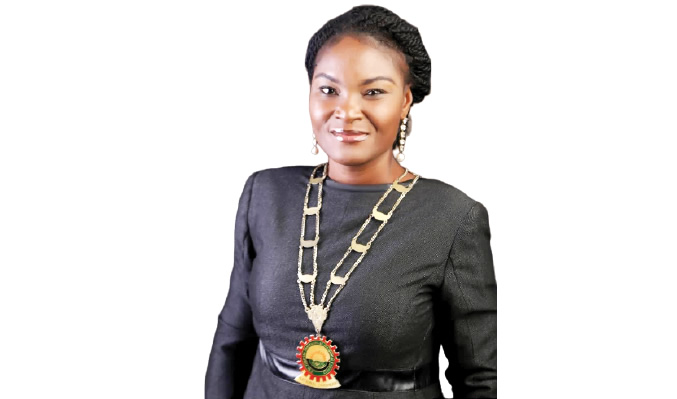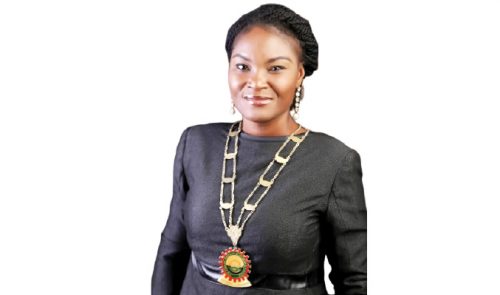The bullying is there in the industry because some of the men cannot stand women being in that field and in that space that they feel is their space, but over time, we have been able to adjust ourselves well. A larger percentage of men in the industry have been able to embrace women and encourage us. So, I want to appreciate the men for being able to embrace us and encourage us in the industry and to create grounds for us to break into the industry.
What does being the national chairman of the Nigerian Institution of Mechanical Engineers mean to you?
It was quite challenging when I took over as the national chairman of the Nigerian Institution of Mechanical Engineers. I was the first female to become the chapter chairman in Lagos, leading all the Lagos mechanical engineers before I became a three-time national executive member of the NIMechE at the national level, and now the national chairman. It was a huge challenge; I had some male colleagues competing with me, but I took the bull by the horns because I had goals and a vision for the institution and I felt that I needed to contribute my quota to the development of mechanical engineering practice in Nigeria. It was a huge challenge and it was one I thought I was going to be able to surmount.
Are you the first female national chairman of NIMechE?
Yes, I am the first female national chairman.
In Nigeria, some mechanical engineers don’t practice the profession. Why is that so?
One of the challenges we have in the country is the employment policies and the categories that we have as employees; so, one of the things that happened to the industry, especially, in the engineering industry, is the lack of curriculum to be able to help the mechanical engineers fit into the industry. There is a huge difference between the classroom and the industry. When I was studying Mechanical Engineering at a higher institution, I had a lot of practical experience. There were modern machines; at that time, the shaping machines and the foundry were working well. Those things were there for us to be able to practice because engineering requires hands-on practical work, skills, development, and things that you can see and touch. So, one of the things that have affected the practice over the years is the lack of good equipment for use in the universities, and the curriculum of the university system itself.
Technology is evolving and things are changing. Dynamism is coming into technology itself and everything is now done on the computer; The Autocad system, the solid works, the industrial aid design, 3D printing, a lot of them have taken over. Unfortunately, the tertiary institutions in Nigeria have not been able to adapt to the world-evolving technology being used in terms of engineering practice all over the world and that is one of the things that have affected the mechanical engineering practice in Nigeria.
Although we have a lot of people who are not practising engineering, there is a huge opportunity in the mechanical engineering space, be it in automobiles, cooling systems, conversion of petrol to compressed natural gas, or production and manufacturing. There is a huge space for mechanical engineers to practice in Nigeria and I feel that as long as we can take the bull by the horns, we will be able to move up in that space. Mechanical engineering is about problem-solving and we have a huge space to solve the problems of Nigeria and to increase the productivity and growth of the country itself.
Many mechanical engineers are also not seen in the area of car production, repairs, and maintenance in the country as it is one of the core areas of the profession. What is your thought on that?
One of the things that have brought about the lack of mechanical engineers going into car production is the economic policies of the country and that is why we must have a lot of engineers in the political space. The policies in the country are not very conducive for production and manufacturing in the country, and that’s why we have that huge space. For instance, we have quite a lot of people going into car production in Nigeria and are trying to strive as businessmen in that industry. The policies must be favourable to create an enabling environment, not just for vehicles, but for different aspects.
Nigeria used to be the production giant in Africa but presently, the policies have not made it possible for production to be able to thrive in Nigeria and I believe that as the President of the Federal Republic of Nigeria, Asiwaju Bola Tinubu, continues to put round pegs in round holes, and engineers begin to have their space in politics and policy-making, it will make it easier for us to go back to where we were before, as the giant of Africa in terms of production and manufacturing.
This is a generation where artificial intelligence and technology are taking the lead in virtually all sectors. What are your thoughts on factors that are making Nigeria lag in this area?
I believe that nothing is drawing us back from artificial intelligence. Nigeria is coming up very gradually in terms of artificial intelligence through data science, data analysis, analytics, and all that. So, I believe that nothing is stopping us; nothing is holding us back; Nigeria is coming up, and we are struggling with it but we are coming because, over time, we have had quite some interaction with the world at large, especially for engineers. We do a lot of interactive and exchange programmes with other countries and universities outside the country. So, I must say that Nigeria is coming up in the area of AI. We have quite a number of our engineers doing well in design, so, I feel that nothing is stopping us; nothing is holding us down. We are getting there and we will surely get there.








